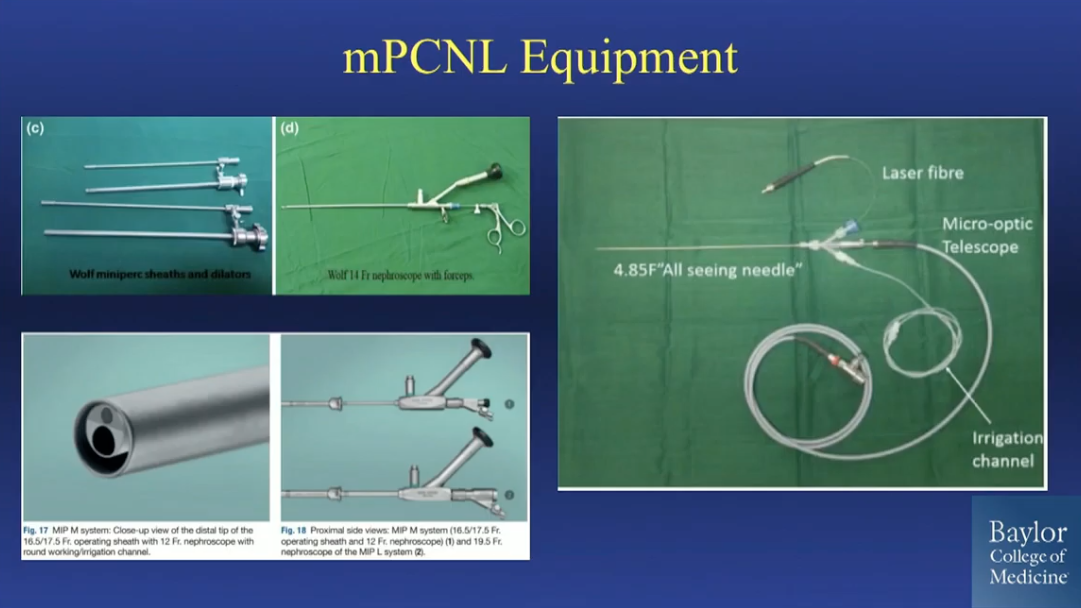Wesley A. Mayer, MD, presented “Mini and Ultra-Mini Percutaneous Nephrostolithotomy: Is It All It’s Cracked up to Be?” during the 24th Annual Innovations in Urologic Practice on September 14, 2019 in Santa Fe, New Mexico.
How to cite: Mayer, Wesley A. “Mini and Ultra-Mini Percutaneous Nephrostolithotomy: Is It All It’s Cracked up to Be?” September 14, 2019. Accessed Feb 2026. https://grandroundsinurology.com/mini-and-ultra-mini-percutaneous-nephrostolithotomy-is-it-all-its-cracked-up-to-be/
Mini and Ultra-Mini Percutaneous Nephrostolithotomy: Is It All It’s Cracked up to Be? – Summary:
Wesley A. Mayer, MD, discusses technological and procedural developments in mini percutaneous nephrostolithotomy (mPCNL) over the last 20 years. He describes the varied tools and methods of the procedure, outlines the lack of data on the efficacy of the procedure, and discusses the advantages and possible drawbacks of this method over standard PCNL.
Abstract:
The current technique of percutaneous nephrostolithotomy (PCNL) for kidney stones was first introduced around 1980. Over time, there has been very little change in the performance of this procedure by most urologists. The American Urological Association (AUA)/Endourological Society Guideline (2016) on the Surgical Management of Stones recommends the use of PCNL for stones > 2 cm and describes it as an option for stones > 1 cm in the lower pole. Despite the broader indications for PCNL, several studies examining trends in stone management demonstrate static usage of PCNL over time while ureteroscopy has increased precipitously. This could be due, in part, to the perceived invasiveness and risks of standard PCNL compared to ureteroscopy.
In the late 1990s, authors first described the use of miniaturized sheaths and scopes to perform a seemingly less invasive percutaneous nephrostolithotomy. These techniques have broadly been categorized as miniaturized PCNL (mPCNL). Over the ensuing two decades, there have been continued advancements in terms of miniaturization of instruments, laser fibers, and other effectors, allowing the development of both ultra-mini PCNL and even micro PCNL. Despite the availability of these miniaturized instruments and techniques, most urologists have not adapted mPCNL into their practices.
This presentation reviews the evolution of PCNL and the revolution of miniaturized PCNL. The various equipment options for mini-, ultra-mini-, and micro PCNL are reviewed. The presentation summarizes data concerning the efficacy and complications of mPCNL in comparison to standard PCNL and retrograde ureteroscopy. Practical considerations, such as compensation and time, are discussed, and a framework for utilization of mPCNL in the stone management landscape is proposed.
About the 24th Annual Innovations in Urologic Practice
Innovations in Urologic Practice (Innovations) is an annual, multi-day, CME-accredited conference devoted to innovative diagnostic and treatment strategies for and controversies related to some of the most common urologic problems in the current era. The topics covered include oncological management of the bladder, kidney, and prostate. The conference also emphasizes general urology topics in pelvic reconstruction and trauma, men’s health, and infections in the urology patient. Dr. Mayer presented this lecture during the 24th Innovations in 2019. Please visit this page in order to register for future Innovations meetings.
ABOUT THE AUTHOR
Wesley A. Mayer, MD, is an associate professor of urology, the vice chair for education of the Scott Department of Urology, and an assistant dean of graduate medical education at Baylor College of Medicine in Houston, Texas. Dr. Mayer earned his medical degree from Baylor College of Medicine, graduating with highest honors. He completed his internship in general surgery and his urology residency at the University of Pennsylvania in Philadelphia, Pennsylvania. Dr. Mayer is fellowship-trained in advanced robotic, laparoscopic, and endoscopic surgery in Baylor College of Medicine’s Scott Department of Urology.
Dr. Mayer specializes in advanced minimally invasive surgical treatments for urologic diseases including robotic, laparoscopic (including single-site), endourologic, and percutaneous surgery. He has a special interest in kidney cancer, kidney stones, upper urinary tract reconstruction, adrenal masses, and transplant urology. He has also published research and has been invited to speak on these topics at several national and international conferences. Dr. Mayer has been repeatedly selected as a “Top Urologist in Houston, Texas” in The Leading Physicians of the World and a “Top Doc” in Houstonia Magazine.


